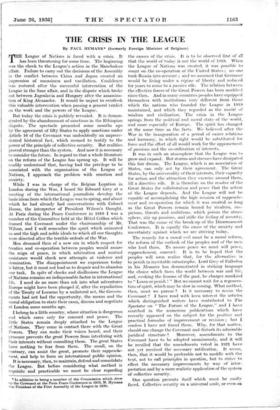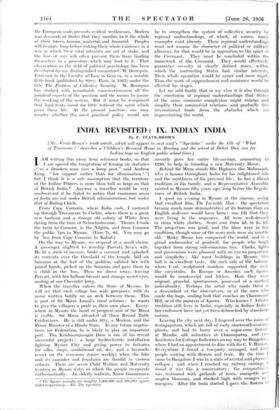THE CRISIS IN THE LEAGUE By PAUL HYMANS• (formerly Foreign
Minister of Belgium) THE League of Nations is faced with a crisis. It has been threatening for some time. The beginning was the check to the League's action in the Manchukuo affair. Failure to carry out the decisions of the Assembly in the conflict between China and Japan created an impression of uneasiness and vacillation. Confidence was restored after the successful intervention of the League in the Saar affair, and in the dispute which broke out between Jugoslavia and Hungary after the assassina- tion of King Alexander. It would be unjust to overlook this valuable intervention when passing a general verdict on the work and the powers of the 'League.
But today the crisis is publicly revealed. It is demon- strated by the abandonment of sanctions in the Ethiopian dispute. The spectacle presented some months ago by the agreement of fifty States to apply sanctions under Article 16 of the Covenant was undoubtedly an unprece- dented historical fact, which seemed to testify to the power of the principle of collective security. But realities proved stronger than the system. And now it is necessary to consider the future. In regard to that a whole literature on the reform of the League has sprung up. It will be readily understood that, having had the privilege to be associated with the organisation of the League of Nations, I approach the problem with emotion and anxiety.
While I was in charge of the Belgian Legation in London during the War, I heard Sir Edward Grey at a meeting of the international journalists develop the basic ideas from which the League was to spring, and about which he had already had conversations with Colonel House, the interpreter of President Wilson's thought. At Paris during the Peace Conference in 1919 I was a member of the Committee held at the Hotel Crillon which framed the Covenant under the chairmanship of Mr. Wilson, and I well remember the spirit which animated us and the high and noble ideals to which all our thoughts were directed after the terrible ordeals of the War.
Men dreamed then of a new era in which respect for treaties and co-operation between peoples would assure the reign of peace, in which arbitration and mutual assistance would check new attempts at violence and domination. The disappointment we experience today is bitter, but it must not lead us to despair and to abandon our task. In spite of checks and disillusions the League of Nations remains an indispensable factor in international life. I need do no more than ask into what adventures Europe might have been plunged if, after the repudiation of the Treaty of Locarno by a unilateral act, the Govern- ments had not had the opportunity, the means and the moral obligation to state their cases, discuss and negotiate at London some months ago.
I belong to a little country, whose situation is dangerous and which cares only for concord and peace. The little States remain deeply attached to the League of Nations. They come in contact there with the Great Powers. They can make their voices heard, and their presence prevents the great Powers from interfering with their interests without consulting them. The great States have nothing to fear from them. The small, on the contrary, can assist the great, promote their rapproche- ment, and help to form an international public opinion.
It is necessary, then, to maintain, defend and consolidate the League. But before considering what method is requisite and practicable we must be clear regarding * In addition to being a member of the Commission which drew up the Covenant at the Paris Peace Conference in 1919, M. Hymana was President of the First Assembly of the League in 1920. the causes of the crisis. It is to be observed first of all that the world of today is not the world of 1919. When the League of Nations was created, it was possible to count on the co-operation of the United States ; no one took Russia into account ; and we assumed that Germany would be living under a regime of liberty and reduced for years to come to a passive role. The relation between the effective forces of the Great Powers has been modified since then. And in many countries peoples have equipped themselves with institutions very different from those which the nations who founded the League in 1919 maintained, and which they regarded as the model of wisdom and civilisation. The crisis in the League springs from the political and moral state of the world.
and more especially of Europe. The spirit has changed at the same time as the facts. We believed after the War in the inauguration of a period of easier relations and harmony, in which right would be substituted for force and the effort of all would work for the appeasement of passions and the co-ordination of interests.
It was in such an atmosphere that the League was to grow and expand. But storms and stresses have dissipated this fair dream. The League, which is an association of States, can only act by their agreement. The Great States, by-the universality of their interests, their capacity for action and the attraction they exercise around them, fill a directive role. It is therefore on the resolve of the Great States for collaboration and peace that the action of the League depends. And the League will not be capable of accomplishing the high mission of rapproche- ment and co-operation for which it was created so long as the Great Powers remain bound by rivalries, sus- picions, threats and ambitions, which poison the atmo- sphere, stir up passions, and stifle the feeling of security.
That was the cause of the break-up of the Disarmament Conference. It is equally the cause of the anxiety and uncertainty against which we are striving today.
The remedy for a moral evil must be a moral reform, the reform of the outlook of the peoples and of the men who lead them. To assure peace we must will pea cc, rapprochement, concord. It is to be hoped that the peoples will soon realise that, for the alternative is to perish in inevitable catastrophe. Lord Grey of Fallodon in his Memoirs has demonstrated in striking language the choice which faces the world between war and life, and, evoking the lessons of the past, he charges mankind to " Learn or perish ! " But we cannot wait for a regenera- tion of spirit, which may be slow in coming. What method, then, must we pursue ? Is it necessary to revise the Covenant ? I have read with keen interest the articles which distinguished writers have contributed to The Spectator on " The Future of the League," and I have searched in the numerous publications which have recently appeared on the subject for the positive and practical formulae of improvement or revision ; but I confess I have not found them. Why, for that matter, should one change the Covenant and disturb its admirable juridical structure ? Moreover, amendments to the Covenant have to be adopted unanimously, and it will be recalled that the amendments voted in 1921 have not yet received the necessary ratification. It seems, then, that it would be preferable not to meddle with the text, not to call principles in question, but to strive to effect the necessary improvements by way of inter- pretation and by a more realistic application of the system of collective security.
One question presents itself which must be coolly faced. Collective security on a universal scale, or even on the European scale, presents evident weaknesses. Modern war demands of States that they sacrifice to it the whole of their forces, human, material and financial. Peoples will hesitate long before risking their whole existence in a war in which their vital interests arc not at stake, and the fear of war will often prevent them from binding themselves to a procedure which may lead to it. That observation in the field of political psychology has been developed by my distinguished compatriot, M. Bourquin, Professor in the Faculty of Law in Geneva, in a notable little book (published by Sircy, Paris, in 1935) under the title The Problem of Collective Security. M. Bourquin has studied with remarkable conscientiousness all the juridical aspects of the question and the means to assure the working of the system. But it must be recognised that legal texts count for little without the spirit which gives them life. At the present juncture, one may wonder whether the most practical policy would not be to strengthen the system of collective security by regional understandings, of which, of course, many examples exist already. These regional understandings must not assume the character of political or military alliances, for that would be in opposition to the spirit of the Covenant. They must be concluded within the framework of the Covenant. They would effectively guarantee security in clearly defined zones, within which the contracting States had similar interests. Their whole operation would be easier and more rapid. Thus the work of rapprochement and assistance would be effected by stages.
Let me add finally that in my view it is also through the conclusion of regional understandings that States of the same economic complexion might enlarge and simplify their commercial relations, and gradually free international trade from the obstacles which are impoverishing the world.











































 Previous page
Previous page